We’re teaming up with the Johns Hopkins School of Advance International Studies (SAIS) in Washington to hold a debate on the Brazilian model of development and its implications for African countries.
Brazil has emerged as a globally significant economic power in the last decade, achieving inclusive growth that has reduced poverty and inequality.
Does this constitute a distinct new ‘model’ of development? And with many African countries currently failing to translate growth into concerted poverty reduction, could Brazil’s experience offer a way forward?
Riordan Roett, Director of the SAIS Latin American Studies Programme and author of The New Brazil will moderate the debate, which will also feature:
- Ed Amann, IRIBA research director, University of Manchester
- Ernani Torres, Federal University of Rio de Janeiro
- Mariana Mota Prado, University of Toronto
- Lindsey Carson, SAIS
Tickets and live stream
The event will be held on Thursday November 20 at 12.30-2.00 EST (5.30-7.00 GMT) and you can apply for tickets here. There will also be a live stream, which will be available via this link.

